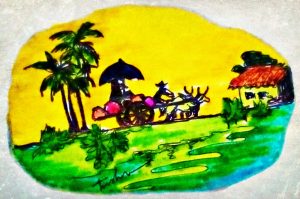FS: Book 1 – Chapter 3
 Wednesday was the day Anadi Rai visited the supermarket in the city to sell the week’s crops and vegetables grown in his village farms. At the ungodly dark hour of 3 AM, four bullock carts got heavily loaded and started their journey along with ten sturdy laborers who carried lit lanterns to find their way through the night roads. The strong beasts would hardly take an hour to cross over ten miles ahead and into the city. They served as irreplaceable assets to their owner, and so the owner went an extra mile to take care of them. Four villagers were employed full time to wash and feed the bulls. Food comprised grains, beans, unfiltered crop remnants, vegetable peels, and even small sized banana trees. They were served in large mud tubs and in huge quantities. The rest of the week these bulls helped in plowing the farm land in pairs.
Wednesday was the day Anadi Rai visited the supermarket in the city to sell the week’s crops and vegetables grown in his village farms. At the ungodly dark hour of 3 AM, four bullock carts got heavily loaded and started their journey along with ten sturdy laborers who carried lit lanterns to find their way through the night roads. The strong beasts would hardly take an hour to cross over ten miles ahead and into the city. They served as irreplaceable assets to their owner, and so the owner went an extra mile to take care of them. Four villagers were employed full time to wash and feed the bulls. Food comprised grains, beans, unfiltered crop remnants, vegetable peels, and even small sized banana trees. They were served in large mud tubs and in huge quantities. The rest of the week these bulls helped in plowing the farm land in pairs.
One such Wednesday Anadi Rai (father in law of Kalo) returned home earlier than usual. Kalo was playing in the lawn with Buri and Gouri with a cotton towel wrapped around her, busy trying to make a doll house with mud and short sticks. Kalo’s mother in law hurried out to her and whispered “Cover your head Kalo, your father-in-law has come”. As per Hindu norms back then, married women covered their heads with the extension of the cloth they had put on when they came across adult men. Kalo knew that. She had seen her mother and aunts and even her elder playmates do it so many times. And now it was her turn too. An innocent bewildered Kalo, not knowing what to do at the moment, pulled up her whole towel and put it on her head. The rest of her was buck naked, exposed for the world to see. Barring Kalo all the faces nearby reddened, while Kalo’s mother-in-law rushed to her rescue guarding the kid behind her, and her father-in-law instantly averted his eyes and uneasily shifted away.
Three months had flown by since Kalo moved in in her husband’s room. All looked peaceful, until a curious relative happened. A certain elderly connection asked Kalo’s mother-in-law if Kalo had any good news to share. That day Kalo’s mother-in-law had no answer. She didn’t have any answer over the next few days for more people who asked her the same question and gossiped about the possibility of the 10 year old girl being sterile. The rumors of Kalo’s inability to conceive spread fast and wide, and in no time Kalo’s husband Jogen got enlightened with the latest talk of the village. Calm and reserved, Jogen decided to handle the crisis in his own way. He sat down with Kalo one evening , ready to talk but not sure how to bring up the topic or make her understand what was going on. At length after silently staring at each other gravely, Jogen simply ended up asking Kalo to join him in the temple for worshiping the Goddess Kalika from the next early morning.
The temple leaned against a big pond, right opposite their house across the street. It stood high above the ground where the mud had settled to form a somewhat misplaced hillock, giving the temple a significant raise from the street level. Broad steps had been cut out to form a little staircase that led up to the front door of the temple. On the top of the temple a large copper trident poked up into the sky. A small golden flag trapped at the sharp edge of the trident flapped against the light wind, reflecting a faint gleam from the first ray of sunlight that kissed the metal. Sharp at 6 AM Kalo was slowly rising the stairs, her head tilted back, trying to grasp the magnitude of the place she was entering. She felt the walls made of burnt mud bricks as she crossed over to the center of the temple amidst the neat garden. A smaller hut with asbestos roof stood there, guarding the sacred ground. Kalo entered to find the end of the trident buried right in the center of this hut, in front of which stood the dark stone deity of the Goddess which Jogen had found from the abandoned cemetery at the end of the village years back. The years under the soil had cast its effect on the deity, dimming the sharpness of the facial features and body curves of the Goddess. A copper bowl filled with water from the adjoining pond, two mango leaves sticking out was placed in front of the base where the Goddess stood.
Every morning Jogen plucked a few fresh flowers from the garden and offered to the deity, filled the copper bowl with water and placed it neatly before sitting to start his prayer service. Kalo would carefully step into that room only to sweep and wash the floor. She was advised never to touch the stone deity of the Goddess. The rules of worship, Jogen had explained Kalo, was that only men could touch the deity and worship it. The Goddess apparently didn’t enjoy being approached by women. Jogen used to chant loud prayers from the Hindu Holy book Vedas, most of which he had learnt by heart. In a copper plate Jogen arranged offerings of fruits, sweets, grains, and other necessary stuff for worshiping; filled a small copper glass with water for the Goddess, lit a candle and incense sticks, and continued incessant chanting in deep heavy voice. The environment looked almost scary to Kalo, who used to flee from the room of worship and peep at her husband curiously from outside. Even in the freezing winter mornings when Kalo wrapped herself tight with her saree and shivered, Jogen would sit in just a thin white dhoti (a piece of cloth men used to wrap around their waist), bare-chested and continue to chant heavily. His voice rang across the emptiness, the magnitude of that prayer service sending a chill down Kalo’s spine.
Of the three sons of Anadi Rai, Jogen was the sharpest and most educated. However Jogen did not have much idea or interest in property and household finance. Once upon a time Anadi Rai used to work for the then village Landlord Asaf Khan at very low wages. But he was a hard working man. Besides taking care of the entire land and its farming, he actively collected tax from the villagers, took steps to improve the roads, water supply and drainage; and even individually approached the villagers to find out their problems and helped them out. Asaf Khan relied and trusted Anadi Rai for his dedication. Anadi Rai saved all the money he earned. His food, clothing and lodging was already been taken care by Asaf Khan. Asaf didn’t have any children of his own, and so Anadi being significantly younger to him was loved a lot. The difference in religion between these men didn’t affect their affection or loyalty.
A heavy famine had hit the village. The few residents started packing and leaving with their families. The whole village had lost all hope of survival. Except Anadi Rai. He never left the village and continued serving the Landlord. Asaf Khan however was eager to leave the place. It was too much of an investment for him and saw too little profit there. He wanted to sell the village lands at a minimal price before departing. But there was no one financially stable enough to take that risk. Asaf was crestfallen and started getting restless every day. Anadi Rai on the other hand had been too attached to the village. This is where he was born, where he grew, where he worked with all his heart and soul. This ground was his mother and father. He could not abandon the village even when everyone else did. One day he took all his savings over the years and approached Asaf Khan asking to let him continue taking care of the village lands. Asaf was moved, and without a second thought knew he had found the right person to give all his land to.
Anadi never looked back once he became the proprietor of the village. He built up the place anew and named the village ‘Nabaghat’ (meaning “New Land”). He stared digging ponds in the village, built up farming lands. Anadi taught the villagers how to plow, and farm, and raise crops; how to raise poultry animals and birds. In course of time the village became a fertile place, suitable for enough people to make a stable living.

Wow, this was cool. Keep writing this kind of texts, you will get a lot of people to this blog if you continue writing this.
Thanks! yes sure I am on it.
Wow, this was usefull. Keep writing this kind of texts, you will get a lot of people to this blog if you continue working on this.
Thank You!
You outline some forced arguments.
It is controversial I agree, but true stories nevertheless.